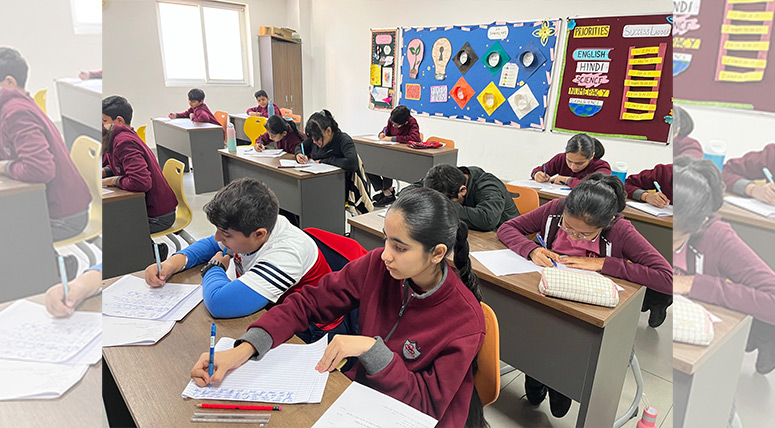“My advice is, never do tomorrow what you can do today. Procrastination is the thief of time.” – Charles Dickens
Charles Dickens best expounds what success is! Procrastination or postponing any work is an enemy which cuts down achievements to pieces. In this blog post, we will also learn how to deal with the negativities of our lives apart from taking and treating TIME seriously!
Numerous stories and their related consequences come in through various sources where students just give up in the fear of exams. First of all, my sincere request to the media is that they should refrain from making viral, incidents of failures.
Please make viral, the stories of achievements and that just passing any exam with a borderline is absolutely normal- even failure is normal. Life is just not about exams. It is much more than this. Life is meaningful in its struggles, heartbreaks, and setbacks. Life means survival. Marks are meaningless if we succumb to mental health ailments. This does not mean we should not work hard and aspire to achieve excellence! Aspiring for Excellence should be our motto but everyone’s definition of excellence is different and unique. So let’s always strive for OUR best! Editor.
FROM THE AUTHOR’S DESK
WHAT IS EXAM STRESS AND HOW IT CAN BE BATTLED?
Yesterday I cleaned out my refrigerator. It’s a task I despise, but despite my dislike of it, it’s a relatively easy job. I checked the leftover items in it, looked at them, and smelled them. If they passed the sniff and sight test, they lived another day. If there was even a hint of spoilage, I would throw them out immediately. I didn’t have to follow any government regulations or fill out any forms. It was just a quick pass or fail assessment. When cleaning out my refrigerator, this quick, subjective assessment system worked just fine. However, the same cannot be applied to educational evaluations. Assessing academic progress is rife with procedures, standards, and a whole bunch of concerns.
“What you think you can do- is your Assessment, What you think you cannot do- is your Limitation. Assess your limitations first, and then limit your assessments.” This is what we teach at Manav Rachna International School.

“Reformation is another name for transformation. It is a sign of development.”
The same is true for Indian schooling, as it is gradually and slowly reforming. India’s educational system has undergone significant changes in the past ten years. MRIS MOHALI is one of the Best CBSE Schools and we know how to engage students with the educational content that has evolved due to the introduction of blended learning, online courses, experiential learning, etc.
Parents and instructors have become anxious about their children’s performance as new assessment methods since it leaves little room for subjectivity and creativity. Already, the epidemic has caused serious educational interruptions and will likely have long-lasting harmful impacts. Despite greatest efforts to adapt to emerging changes, online education has caused learning losses.
In today’s world, stress is an integral part of life because many things act as stress catalysts. One of the main stressors experienced by students is academic achievement. Due to various reasons, including the pressure of meeting the expectations of your parents, teachers, and even themselves, students may feel compelled to obtain certain grades.
Often, students become so tense before an exam that they struggle (or, in some circumstances, fail) to perform well. The worry that they need to study more is one of the things that make tests stressful. Additionally, juggling your education, family issues, schedule, and social life can be challenging due to increased work load and complexity of the courses.
Exam stress is common among students, especially during high-stakes testing periods. It can be defined as the feeling of anxiety and fear that arises in response to the pressure and demands of exams. This stress can harm a student’s mental and physical health, as well as their ability to perform well in exams.
There are several factors which contribute to the exam stress. The first is the critical nature of exams. For many students, exams are seen as a make-or-break moment in their academic careers. Not up to the mark performance on an exam can have serious consequences, such as lower grades, low self-esteem or self-image. This pressure to perform can be overwhelming, leading to feelings of anxiety and fear.
Another contributing factor to exam stress is the fear of failure. Many students have high expectations for themselves, and the thought of not achieving them can be frightening and disheartening at the same time. This fear can lead to avoidance behaviors, such as procrastination or avoidance of studying altogether.
Exam stress can also be caused by a lack of preparation. When students do not feel adequately prepared for an exam, they may experience increased stress and anxiety levels. This can be due to various reasons, such as not having enough time to study, not understanding the material, or not having access to the necessary resources.

In addition to these factors, exam stress can also be exacerbated by external factors, such as family and personal relationships, social obligations, peer pressure, etc. These stressors can make it even more difficult for students to focus on their studies and perform well on exams.
So, how can exam stress be battled? One effective way to combat exam stress is to develop good study habits and a consistent routine. This means setting aside dedicated time each day to study, breaking down the material into manageable chunks, and using effective study techniques, such as summarizing, highlighting, and practicing with sample questions.
Another effective strategy is to seek out support from others. This can include seeking help from teachers, tutors, or peers who can provide guidance and support. It can also involve seeking emotional support from friends and family members who can provide encouragement and motivation.
In addition, it can be helpful to engage in activities that promote relaxation and stress reduction. This can include regular exercise, practicing deep breathing and mindfulness, and engaging in hobbies and activities that bring joy and peace.
It is also essential to recognize the signs of exam stress and take steps to address them. These signs can include difficulty concentrating, forgetfulness, irritability, and physical symptoms such as headaches, stomachaches, and sleep disturbances. If these symptoms persist, it may be necessary to seek professional help.
Finally, it should be noted that exam stress is a common phenomenon among students. It is caused by a variety of factors, including the high-stakes nature of exams, fear of failure, lack of preparation, and external stressors. To combat exam stress, students can develop good study habits, seek support from others, engage in relaxation and stress-reduction activities, and recognize and address the signs of exam stress. By taking these steps, students can reduce their stress levels, improve their performance in exams and can achieve success.
Recent years have seen a shift in people’s attitudes towards exams. Mentors of Manav Rachna International School, Mohali are always for their students. However, the way curriculum learning assessments are currently being implemented has affected people’s perspectives on academic accreditation. Exam preparation strategies among parents, teachers, and schools are also evolving. Children are now able to perform well in their interest areas due to comprehensive advancements. Recognition for an individual’s development rather than grades can have a significant impact.
In addition to the above-mentioned steps, I want to highlight the efforts of CBSE in reducing stress among students and parents. The Central Board of Secondary Education (CBSE) is the national-level Board of Education in India that conduct exams and awards certificates to students who have completed their secondary and higher secondary education. In recent years, the CBSE has made changes to its assessment and grading system to reduce exam stress and promote a more holistic approach to education.
One significant change that the CBSE has made is the introduction of continuous and comprehensive evaluation (CCE) in place of traditional exams. Under the CCE system, students are evaluated regularly throughout the academic year rather than being tested only at the end of the year. This allows for a more comprehensive evaluation of a student’s progress and reduces the emphasis on a single high-stakes exam.
The CBSE has also implemented a grading system that uses a 9-point scale instead of the traditional letter grades. This allows for a more nuanced evaluation of a student’s performance and it allows for a more excellent range of grades.
These changes have had a positive impact on students and parents concerned about exam stress. Additionally, the CBSE’s focus on a more holistic approach to education has encouraged students to focus on their overall development rather than just their academic performance. This has helped in reduction of pressure on students to achieve perfect grades, and allowing them to focus on their personal growth and well-being.
Parents have also benefited from these changes, as they no longer have to worry as much about their child’s performance on a single exam.
The CBSE (Central Board of Secondary Education) has a dedicated helpline for students experiencing exa- related anxiety and needing counselling. The helpline number is 1800 11 8002, and is available from 10:00 AM to 4:00 PM on all working days.
The helpline offers students with access to trained counsellors who can provide them with advice and support on managing exam-related anxiety. The counsellors can also guide in exam preparation, time management, and stress management techniques.
Students can also visit the CBSE website (www.cbse.gov.in) and click on the “Main Website” tab to access a range of resources and information on exam-related anxiety and counselling (https://www.cbse.gov.in/cbsenew/prunit_temp/index.html). These resources include tips on how to prepare for exams, how to manage exam stress, and how to stay focused and motivated during the exam period.
In addition to the helpline and online resources, the CBSE also provide students with access to a team of trained examiners who can provide with guidance and support on exam-related issues. These examiners can be contacted through the CBSE regional offices. They can offer students with assistance on a diverse range of topics including exam preparation, exam anxiety, and exam stress management.
In conclusion, exam stress is a common phenomenon among students, and it can negatively affect their mental and physical health, and their academic performance.
“The only way to do well on a test is to study hard, stay focused, and believe in yourself.”
This quote highlights the importance of putting in the effort and staying focused in order to succeed in exams. Success in an exam doesn’t define the person you are. Everybody responds to situations differently, and your persona is far more important than how you perform on an examination. Simply put, an examination measures your learning.
You can conquer the examinations if you put your fears and anxiety into balance. I hope these quick suggestions may help you manage your exam stress. It also emphasizes the importance of believing in oneself and one’s ability to overcome challenges.
Author: Navpreet Kaur Bajwa, Lead Science and PGT Physics, Manav Rachna International School, Mohali






